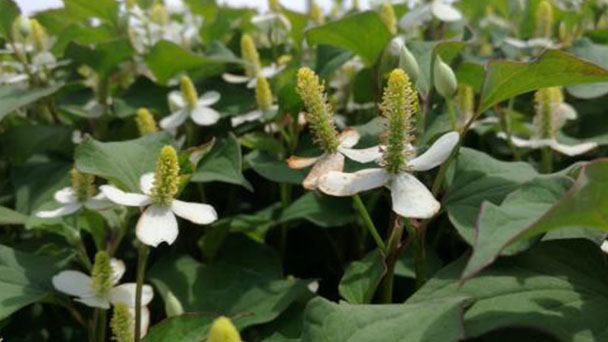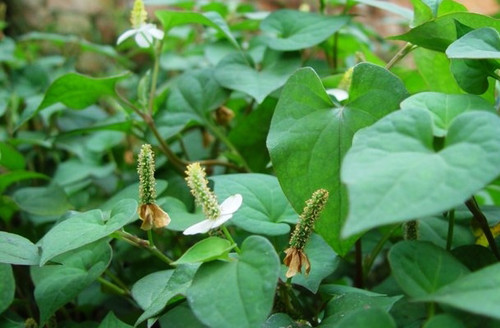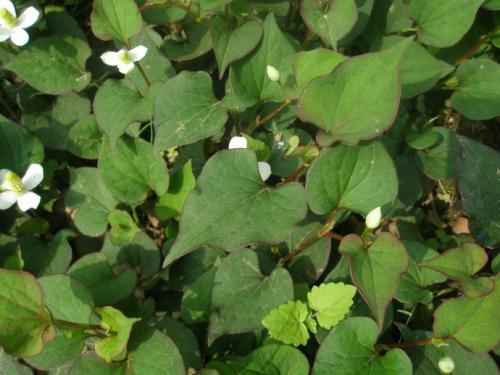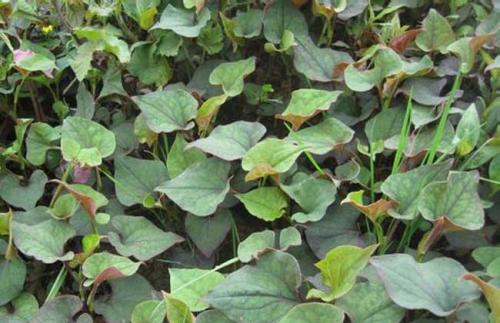Chameleon plant profile
Written by Maggie
Jan 20 2021

Chameleon plant, scientific name Houttuynia cordata, is the Chameleon plant of the genus Chameleon, which is included in the Chinese Pharmacopoeia. At the same time, it is a very common plant, which may be seen by all but unknown. Today, we will briefly introduce the Chameleon plant.

Morphological characteristics of Chameleon plant
Chameleon plant is a perennial herb, 30 ~ 50 cm high, the whole plant has a fishy smell; The upper part of the stem is erect, often purplish red, the lower part is prostate, the node is whorled on the small root. Leaves are alternate, thin paper, glandular spots, abaxially especially, ovate or broadly ovate, base cordate, whole, abaxially often purplish red, palmate veins 5 ~ 7, petiole 1 ~ 3.5 cm long, glabrous, stipules membrane 1 ~ 2.5 cm long, lower part and petiole together into a sheath. The flowers are small, open in summer, without perianth, arranged opposite to the leaves in spikes about 2 cm long, with 4 involucral bracts, at the apex of the pedicel, white, petal-like, with 3 stamens, long filaments, connate with ovary at the lower part, pistil composed of 3 connate carpels. Capsule is subglobose, apically dehiscent, with persistent style. Seeds are numerous, ovate. Flowering period is from May to June, fruiting from October to November.
Chameleon plant growth habits and distribution
Growth habits: chameleon plants wild in wet or watery lowland, like warm and humid environments, avoid drought. Chameleon plants are cold resistant, afraid of strong light, and can overwinter at -15℃. The soil grows best in rich sandy loam and humus loam, but is not suitable for clay and alkaline soil cultivation.
Distribution: chameleon plant is native to the south provinces of the Yangtze River basin in China, many wetlands, the valley shade can also vine. As early as the late 1980s, Gaoping Town, Guanghan City, Sichuan Province, introduced large-scale field planting, which has led to nearly 10,000 acre of planting area in surrounding towns and villages, forming the largest ear root planting base in China at present. Zhejiang, Jiangsu, Hubei, Anhui, Fujian, Sichuan, Guangdong, Guangxi, Hunan, Guizhou, Shaanxi and other places are also planted.

The growing method of Chameleon plant
Chameleon plant is best propagated by roots: in spring, dig out the roots of the old seedlings and cut the white and strong rhizome into small sections of 10-12cm, each section with 2 buds. Plant in holes according to the row spacing of 20cm*20cm, propagate, cover with soil of 3-4cm, water after a little pressing, and the new buds can grow after a week. Spraying a new high lipid film on the surface of seedlings can prevent the infection of germs, improve the intensity of photosynthesis and protect the healthy growth of seedlings.
The Chameleon plant should be watered frequently after planting, and the soil should be kept moist. After the emergence of the Chameleon plant, weeds in the field should be removed frequently. If ridges are sealed on the ground of the Chameleon plant, weeding can be avoided to avoid damaging the roots and seedlings of the Chameleon plant.
Propagation method of Chameleon plant
The propagation methods of Chameleon plants can be divided into seed propagation, rhizome propagation and branching propagation. Because the germination rate of seeds is not high, and the temperature of germination is suitable for 17-25 ℃, but the germination rate is only about 20 {bf}, rhizome propagation is generally adopted. Dig out the roots of the old seedlings in spring, choose the white and strong rhizome cut into each section 5 ~ 10cm long, ensure that each section has 3 ~ 4 sections, according to the row spacing of 20cm×20cm hole planting, plant the seeds in the trench flat covered with soil 3 ~ 4cm, a little light pressure after watering to keep the land moist, a week later can give rise to new buds.
Main value of Chameleon Plant
Ingredients: Chameleon plant can also be eaten, often used for salad, Chameleon plant, Chameleon plant steamed chicken, Chameleon plant scrambled eggs, Chameleon plant fried shredded meat. In a word, Chameleon plant is a common condiment in southern China, and its leaves can also be eaten.
Pharmaceutical use: The dry aboveground part of Chameleon plant can clear heat and detoxify, detumescence. Chameleon plant has a good treatment of lung heat, lung carbuncle fever cough, cough rancid sputum, often with Platycodon grandiflorum, root, dandelion with application, to strengthen the effect of expectorant, hot poison furuncle swelling, can be decocted alone, or with fresh pounded compress.
Chameleon Plant flower language
Pulse. Blessed by the flower of the birth of the people, life competitive, rarely plain people.

Latest Updated
- Benefits of Bugleweed - 7 Science-backed Health Benefits
- Bugleweed Dangers & Side Effects - Is It Poisonous?
- How to Plant Evergreen Trees - What You Should Know
- When to Plant Evergreens - Grow Guide for Evergreen Trees
- 12 Wonderful Evergreen Shrubs for Your Garden
- 12 Popular Evergreen Plants with Pictures for Beginners
- When And How To Prune A Lilac Bush Like a Pro
- How to Grow & Care for Lilac Vine (Hardenbergia Violacea)
- Japanese Lilac Tree (Syringa Reticulata) Care & Propagation Guide
- Shumard Oak Pros and Cons - What to Know
Popular Articles
- Winter maintenance of Antirrhinum Majus
- How to Grow Terminalia Mantaly Tree
- How to Grow and Care for Crossostephium Chinense
- How to grow Antirrhinum Majus in spring
- Peristeria Elata (Dove Orchid) Profile: Info & Care Guide
- Underwatered Snake Plant (Sansevieria Trifasciata) - Signs And How To Fix
- How to Care for Brazilian Jasmine Plant (Mandevilla Sanderi)
- How to Grow & Care for Graptopetalum Purple Delight in Summer
- Rosa Chinensis (China Rose): Plant Growing & Care Tips
- How to Care for Baby Sun Rose (Aptenia Cordifolia)